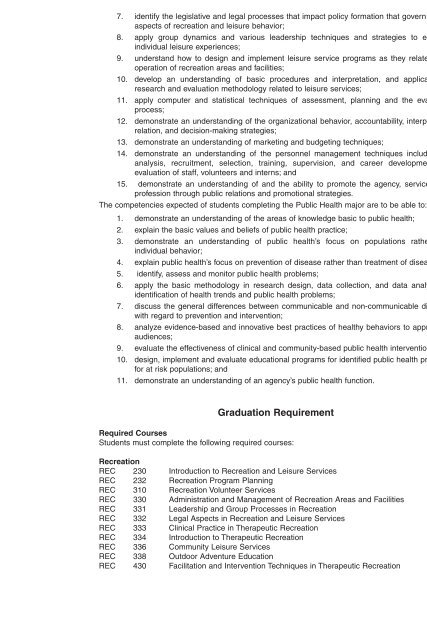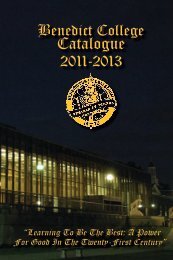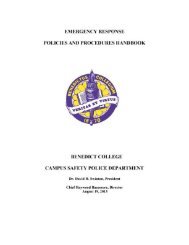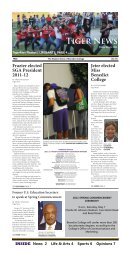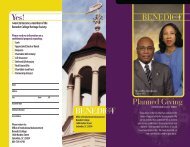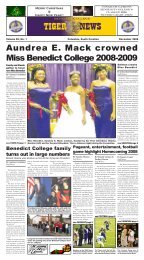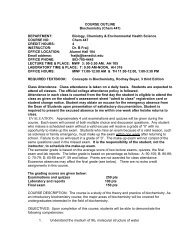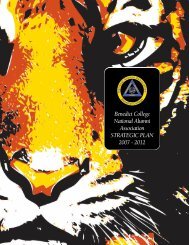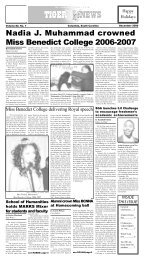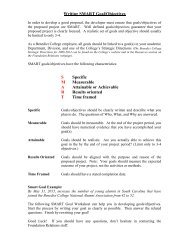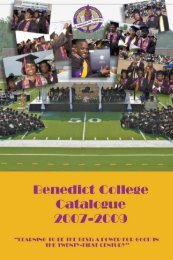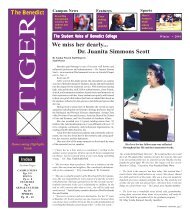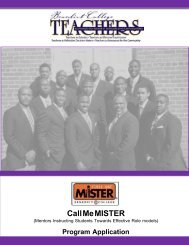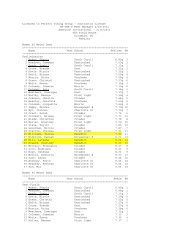2009-2011 - Benedict College
2009-2011 - Benedict College
2009-2011 - Benedict College
You also want an ePaper? Increase the reach of your titles
YUMPU automatically turns print PDFs into web optimized ePapers that Google loves.
HEALTH, PHYSICAL EDUCATION AND RECREATION DEPARTMENT 105<br />
7. identify the legislative and legal processes that impact policy formation that govern certain<br />
aspects of recreation and leisure behavior;<br />
8. apply group dynamics and various leadership techniques and strategies to enhance<br />
individual leisure experiences;<br />
9. understand how to design and implement leisure service programs as they relate to the<br />
operation of recreation areas and facilities;<br />
10. develop an understanding of basic procedures and interpretation, and application of<br />
research and evaluation methodology related to leisure services;<br />
11. apply computer and statistical techniques of assessment, planning and the evaluation<br />
process;<br />
12. demonstrate an understanding of the organizational behavior, accountability, interpersonal<br />
relation, and decision-making strategies;<br />
13. demonstrate an understanding of marketing and budgeting techniques;<br />
14. demonstrate an understanding of the personnel management techniques including job<br />
analysis, recruitment, selection, training, supervision, and career development and<br />
evaluation of staff, volunteers and interns; and<br />
15. demonstrate an understanding of and the ability to promote the agency, services, and<br />
profession through public relations and promotional strategies.<br />
The competencies expected of students completing the Public Health major are to be able to:<br />
1. demonstrate an understanding of the areas of knowledge basic to public health;<br />
2. explain the basic values and beliefs of public health practice;<br />
3. demonstrate an understanding of public health’s focus on populations rather than<br />
individual behavior;<br />
4. explain public health’s focus on prevention of disease rather than treatment of disease;<br />
5. identify, assess and monitor public health problems;<br />
6. apply the basic methodology in research design, data collection, and data analysis for<br />
identification of health trends and public health problems;<br />
7. discuss the general differences between communicable and non-communicable diseases<br />
with regard to prevention and intervention;<br />
8. analyze evidence-based and innovative best practices of healthy behaviors to appropriate<br />
audiences;<br />
9. evaluate the effectiveness of clinical and community-based public health interventions;<br />
10. design, implement and evaluate educational programs for identified public health problems<br />
for at risk populations; and<br />
11. demonstrate an understanding of an agency’s public health function.<br />
Graduation Requirement<br />
Required Courses<br />
Students must complete the following required courses:<br />
Recreation<br />
REC 230 Introduction to Recreation and Leisure Services<br />
REC 232 Recreation Program Planning<br />
REC 310 Recreation Volunteer Services<br />
REC 330 Administration and Management of Recreation Areas and Facilities<br />
REC 331 Leadership and Group Processes in Recreation<br />
REC 332 Legal Aspects in Recreation and Leisure Services<br />
REC 333 Clinical Practice in Therapeutic Recreation<br />
REC 334 Introduction to Therapeutic Recreation<br />
REC 336 Community Leisure Services<br />
REC 338 Outdoor Adventure Education<br />
REC 430 Facilitation and Intervention Techniques in Therapeutic Recreation


